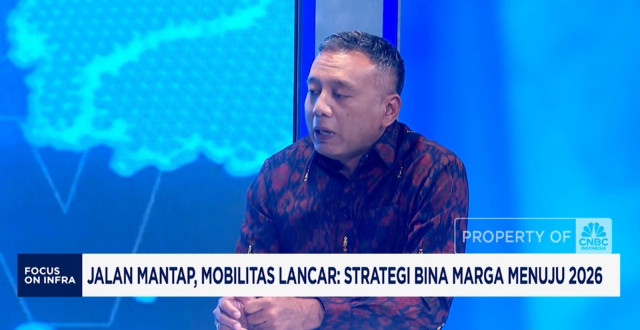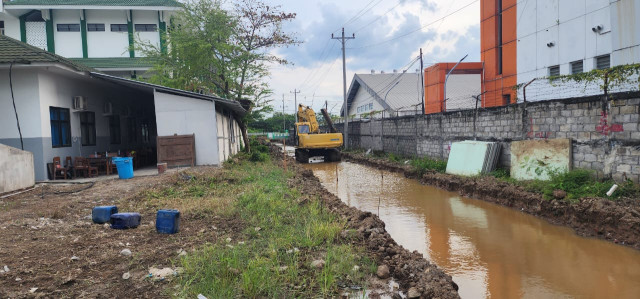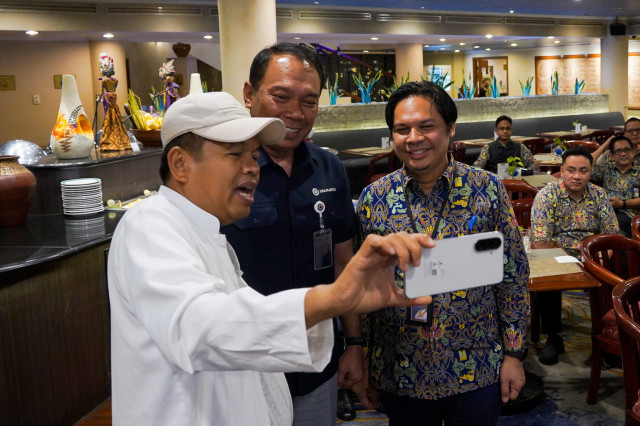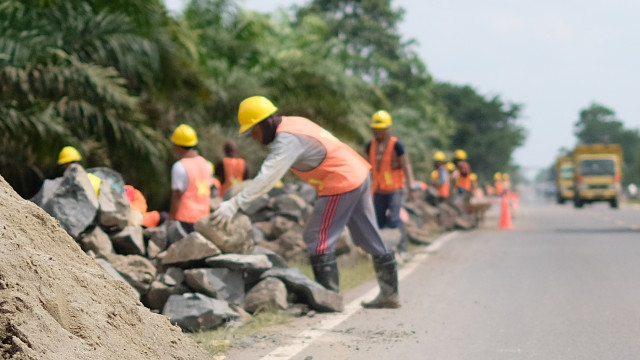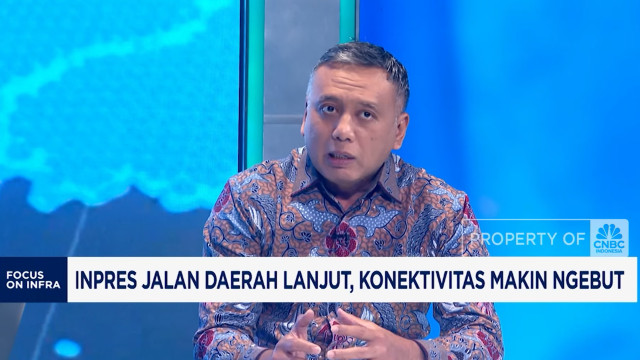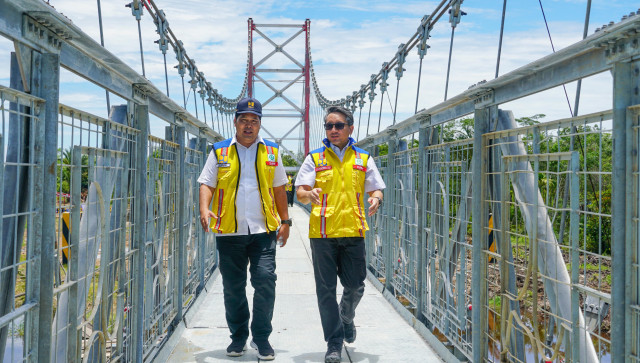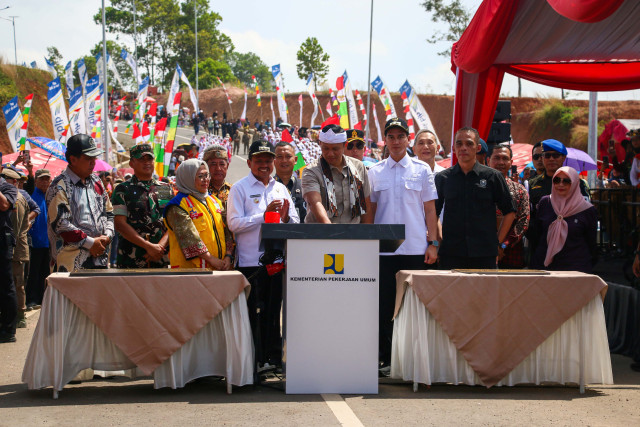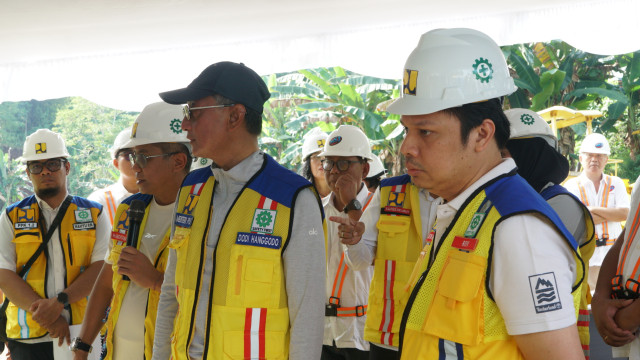GELIAT UTILIZATION OF RUBBER ASPHALT
- 10 Apr 2019
- News/General
- 842 viewed

MUARA ENIM (BINA MARGA) - Processing of natural rubber from farmers as a mixture of asphalt is being boosted. This was done to absorb national natural rubber production so as to help stabilize market prices.
In 2019, the Ministry of Public Works and Public Housing (PUPR) plans to use rubber asphalt from latex totaling 2542.2 tons to pave 65.8 km of National Road.
The Director of Preservation, Directorate General of Highways, Atyanto Busono said besides stabilizing the price of using rubber for asphalt mixes as well as a tangible form of sustainable infrastructure development. "In addition to rubber, we also use plastic asphalt and Buton asphalt in Eastern Indonesia," he said when met after a demonstration of rubber asphalt laying in Muara Enim Regency, South Sumatra, Tuesday, March 9, 2019.
Not only that, the Directorate General of Highways this year will also buy Bokar Basah from farmers totaling 2,504 tons, equivalent to 17,889 tons of rubberized asphalt. As information, Latex and Wet Bokar are products derived directly from the rubber sap of farmers.
Latex and Bokar will be processed by the rubber industry, each being pre-vulcanized latex and Sir 20 pre-vulcanized compounds. Every 93% of asphalt will be mixed with 7% of one of the processed rubber into bulk rubber asphalt.
Bulk rubber asphalt is then mixed with aggregate at the Asphalt Mixing Plant (AMP) facility. The mixture is 94% aggregate and 6% rubber asphalt. From AMP, asphalt laying on the road location is carried out.
Both latex and bokar, directly bought to rubber farmers. "We do direct purchases to farmers, cutting the chain so that prices are good," explained Atyanto.
On the same occasion the Head of the National Road Implementation Center V, KGS Saeful Anwar explained that until the first week, April 2019, his party had bought 357 tons of wet bokar directly from 3,138 farmers in South Sumatra for Rp. 4 billion.
Bokar was bought at a price of Rp. 7,700 to Rp. 11,000 per kilogram. The price has risen after touching Rp. 5000 per kilogram. According to the Bina Marga purchase data on the island of Sumatra (Jambi, South Sumatra, Lampung) the price of bokar per kilogram increased significantly in March.
In addition, according to Saeful this year in South Sumatra, it will use rubber asphalt in only a few sections, namely Tebingtinggi-Jembatan Kimim Besar with a length of 700 meters (21.6 tons), Bts Kab. Musi Rawas-Tebingtinggi 800 meters (29.8 tons) high, Prabumulih-Beringin along Bts. Kab. Oku along 5.6 km (216 tons), and base stations. Kab. Oku-Baturaja is 1.6 km (60.9 tons).

Expansion of Rubber Asphalt Applications
Director Atyanto acknowledged that the use of rubberized asphalt for National roads is still small. "National roads are not long compared to district roads," he said.
Besides in South Sumatra, the use of rubber asphalt is also carried out on the National Road in the Provinces of North Sumatra Jambi, Banten, West Java, Central Java, East Java, Central Kalimantan and West Kalimantan.
He said that for the National Road instructions for the use of rubber asphalt had been regulated in a Circular (SE) Minister of Public Works and Public Housing and Circular Letter of the Director General of Highways.
"As for the province, there is a Minister of Home Affairs to all regional administrations, both regencies or provinces, to use rubber asphalt," he said. In addition, the use of rubber asphalt in National and Regional Roads throughout Indonesia will be regulated in Norms, Standards, Guidelines and Criteria (NSPK).
According to Bina Marga data, 27,865.46 Km National Road, 29,720 Km Provincial Road, and 297,485 Km Regency Roads in Sumatra, Kalimantan and Java have the potential to use rubber asphalt.
Seeing the large potential application of using rubber asphalt in Regional Roads, Atyanto said that the Directorate of Preservation and Road and Bridge Centers (Pusjatan) will form a technical assistance team on mixing and laying rubber asphalt when needed by the region.
In the demonstration of the rubber asphalt laying out, the Minister of Public Works and Public Housing, Basuki Hadimuljono, the Minister of Transportation, Budi Karya Sumadi, and the Governor of South Sumatra, Herman Deru. (Ian)


